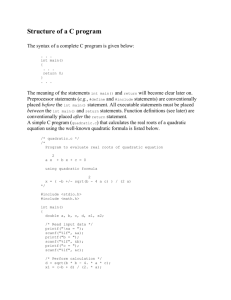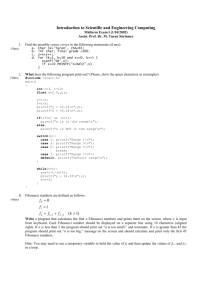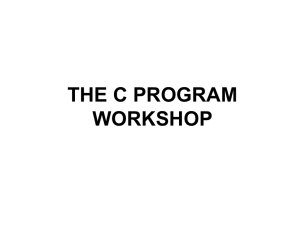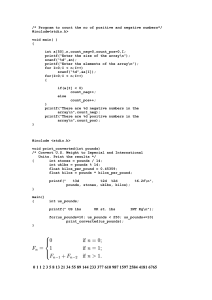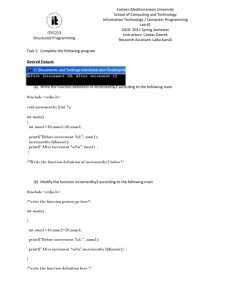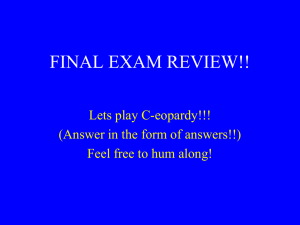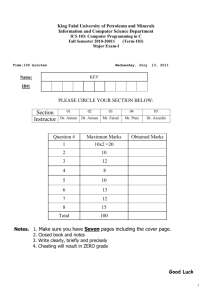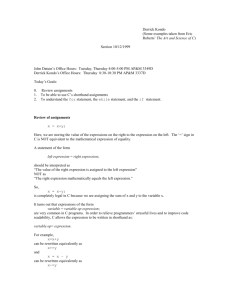Chapter 2 Introduction to the C Language
advertisement
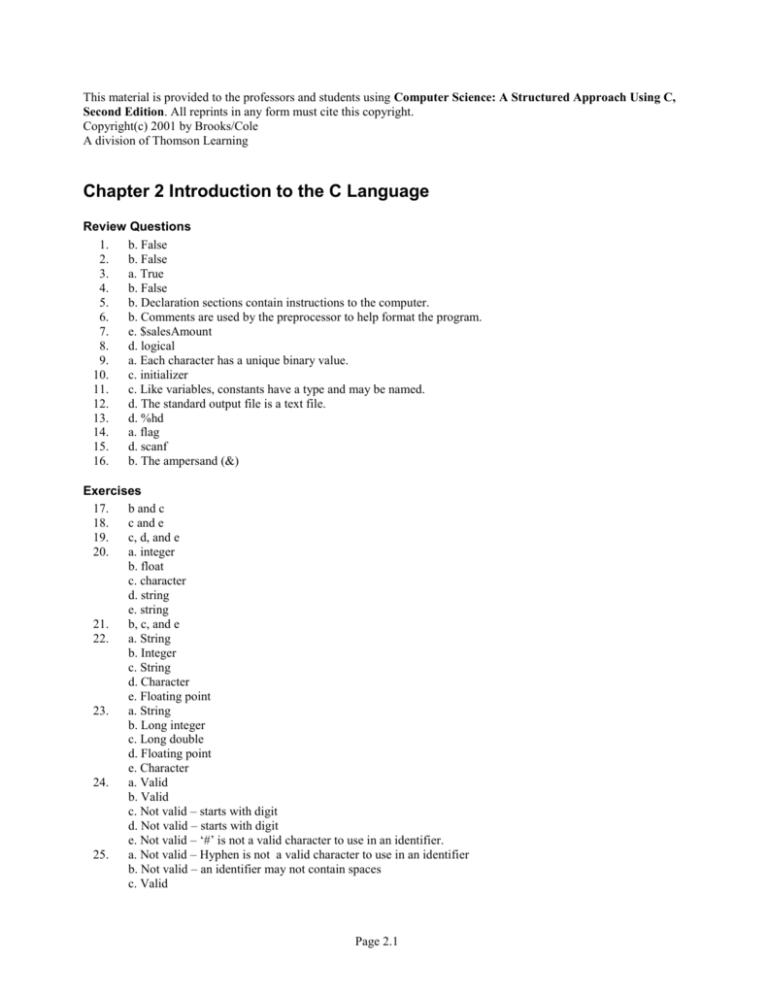
This material is provided to the professors and students using Computer Science: A Structured Approach Using C,
Second Edition. All reprints in any form must cite this copyright.
Copyright(c) 2001 by Brooks/Cole
A division of Thomson Learning
Chapter 2 Introduction to the C Language
Review Questions
1.
b. False
2.
b. False
3.
a. True
4.
b. False
5.
b. Declaration sections contain instructions to the computer.
6.
b. Comments are used by the preprocessor to help format the program.
7.
e. $salesAmount
8.
d. logical
9.
a. Each character has a unique binary value.
10.
c. initializer
11.
c. Like variables, constants have a type and may be named.
12.
d. The standard output file is a text file.
13.
d. %hd
14.
a. flag
15.
d. scanf
16.
b. The ampersand (&)
Exercises
17.
b and c
18.
c and e
19.
c, d, and e
20.
a. integer
b. float
c. character
d. string
e. string
21.
b, c, and e
22.
a. String
b. Integer
c. String
d. Character
e. Floating point
23.
a. String
b. Long integer
c. Long double
d. Floating point
e. Character
24.
a. Valid
b. Valid
c. Not valid – starts with digit
d. Not valid – starts with digit
e. Not valid – ‘#’ is not a valid character to use in an identifier.
25.
a. Not valid – Hyphen is not a valid character to use in an identifier
b. Not valid – an identifier may not contain spaces
c. Valid
Page 2.1
26.
27.
28.
29.
30.
31.
32.
d. Valid
e. Valid
First
Example
:
10
, w is Y
z is
5.12
The following lines must be changed to read as follows:
Line 1:
/* This program does nothing */
Line 2:
int main (void)
The following lines must be changed to read as follows:
Line 1:
#include <stdio.h>
Line 4:
printf ("Hello World");
Last line:
}
The following lines must be changed to read as follows:
Line 1:
#include <stdio.h>
Line 4:
printf ("We are to learn correct");
Line 5:
printf ("C language here");
Last line:
} /* main */
The following lines must be changed to read as follows:
Before main
#include <stdio.h>
Line 7:
int
a;
Line 8:
float b;
Line 9:
char c;
The following lines must be changed to read as follows:
Before main:
#include <stdio.h>
Line 7:
int
a;
Line 8:
double b;
Line 9:
char
c;
char
d;
/* we recommned only one definition per line */
The following lines must be changed to read as follows:
Line 7: We Recommned Only One Definition Per Line.
int
a;
Line 8:
char
b;
char
c;
char
d;
Page 2.2
Line 9: d cannot be declared twice
double e;
double f;
Problems
33.
a. char option;
b. int sum = 0;
c. float product = 1.0;
34.
a. short code;
b. #define salesTax .0825
– or –
const double salesTax .0825;
c. double sum = 0.0;
35.
printf("The sales total is: $%10.2f\n", cost);
36.
/* This program uses four print statements.
Written by :
Date:
*/
#include <stdio.h>
int main (void)
{
/* Statements */
printf ("******\n");
printf ("******\n");
printf ("******\n");
printf ("******\n");
}
return 0;
/* main */
37.
/* This program uses four print statements.
Written by :
Date:
*/
#include <stdio.h>
int main (void)
{
/* Statements */
printf ("*\n");
printf ("**\n");
printf ("***\n");
printf ("****\n");
return 0;
} /* main */
38.
/* This program uses defined, memory, and literal constants.
Written by :
Date:
*/
#include <stdio.h>
#define A 'a'
Page 2.3
#define
#define
#define
#define
int main
{
/* Local
const
const
const
const
const
E
I
O
U
'e'
'i'
'o'
'u'
(void)
definitions
int even0 =
int even2 =
int even4 =
int even6 =
int even8 =
*/
0;
2;
4;
6;
8;
/* Statements */
printf ("%3c%3c%3c%3c%3c\n", A, E, I, O, U);
printf ("%3d%3d%3d%3d%3d\n",
even0, even2, even4, even6, even8);
printf ("%3d%3d%3d%3d%3d\n", 1, 3, 5, 7, 9);
}
return 0;
/* end of main */
39.
/* This program compares the decimal conversion code to
the float conversion code.
Written by:
Date:
*/
#include <stdio.h>
int main
{
/* Local
int a
int b
int c
int d
int e
(void)
Definitions */
= 1;
= 10;
= 100;
= 1000;
= 10000;
/* Statements */
printf ("%d %d %d %d %d\n", a, b, c, d, e);
printf ("%f %f %f %f %f\n", a, b, c, d, e);
}
return 0;
/* end of main */
The results of running the program are shown below. The first line prints correctly because the data type
(integer) matches the format conversion code (%d). The second line is incorrect because the data type does not
match the format conversion code (%f).
(Note: you may get different results for the second line depending on the computer and compiler you use):
Results:
1 10 100 1000 10000
0.000000 0.000000 0.000000 0.000000 0.000000
Page 2.4
40.
/* This program demonstrates the use of scanf and printf
Written by :
Date:
*/
#include <stdio.h>
int main
{
/* Local
int
float
(void)
Definitions */
quantity;
unitPrice;
/* Statements */
printf("\nEnter quantity & price (XXX XXX.XX): ");
scanf ("%d %f", &quantity, &unitPrice);
printf("\nQuantity
: %6d\n", quantity);
printf("Unit Price : %6.2f\n", unitPrice);
41.
return 0;
} /* end of main */
Note: Depending on your computer and compiler, you may get different results.
/* This program prints an integer using different
conversion codes: character, decimal and float.
Written by :
Date:
*/
#include <stdio.h>
int main (void)
{
/* Local Definitions */
int num;
/* Statements */
printf ("\nEnter an integer: ");
scanf ("%d", &num);
printf ("The number as a character: %c\n", num);
printf ("The number as a decimal : %d\n", num);
printf ("The number as a float
: %f\n", num);
}
return 0;
/* end of main */
Page 2.5
